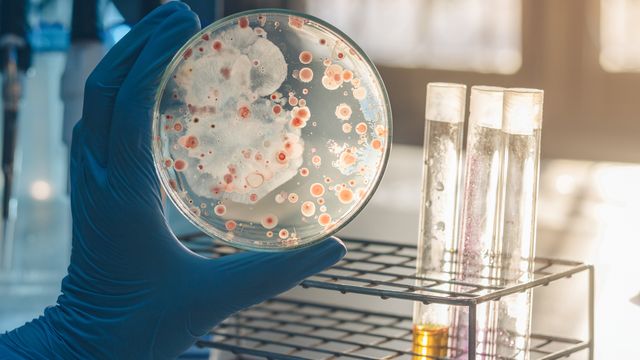Fusarium spp. Culture Testing in Crop Plants
The Fusarium species are a group of soil-inhabiting fungi that can cause significant damage to crop plants, leading to yield reductions and quality issues. Fusarium spp. culture testing is essential for identifying the presence of these pathogens in agricultural environments. This service helps in understanding the prevalence and potential impact on crops, which is critical for effective management strategies.
The process begins with the collection of plant samples from fields suspected to be affected by Fusarium. Samples are typically taken from roots, stems, or leaves, depending on the specific symptoms observed. Once collected, these samples undergo rigorous sterile processing in the laboratory environment to avoid contamination and ensure accurate results.
The next step involves inoculation of the processed sample into appropriate growth media designed to support the growth of Fusarium spp. This includes the use of selective culture media that enhance the visibility of Fusarium colonies. The samples are then incubated under controlled conditions, such as specific temperatures and humidities, to optimize fungal growth.
After several days of incubation, the media is visually inspected for characteristic Fusarium colony morphologies. These colonies exhibit distinct colors and textures that differentiate them from other fungi present in the environment. This visual inspection is supplemented by microscopic examination using a compound microscope equipped with differential interference contrast (DIC) optics to further confirm species identification.
Once identified, quantitative assessment of Fusarium spp. can be conducted via colony count or biomass estimation techniques. These methods provide insights into the relative abundance of the pathogen within the sampled environment. Additionally, molecular techniques such as PCR-based assays may also be employed for more precise quantification and differentiation between closely related species.
The results from this testing are crucial for developing targeted interventions to mitigate Fusarium-related crop losses. They inform decisions on the use of fungicides, crop rotation practices, or other sustainable agricultural management strategies aimed at reducing pathogen pressure. Understanding the extent and type of Fusarium present allows for more informed decision-making processes that can enhance crop health and productivity.
The importance of accurate Fusarium spp. culture testing cannot be overstated, particularly in regions where these pathogens are prevalent. By providing reliable data on Fusarium presence and abundance, laboratories like ours contribute significantly to the overall resilience of agricultural systems against fungal diseases.
Eurolab Advantages
EuroLab stands out as a leader in microbiological testing services for Fusarium spp., offering unparalleled expertise and cutting-edge technology to ensure accurate and reliable results. With our state-of-the-art facilities and experienced team of scientists, we provide comprehensive support throughout the entire testing process—from sample collection guidance to detailed reporting.
We leverage advanced growth media specifically formulated for Fusarium spp., ensuring optimal conditions for their detection. Our laboratories are equipped with sophisticated instruments like high-resolution microscopes for precise colony identification and quantification, and we employ validated methods that comply strictly with international standards.
- Comprehensive Sample Handling: From initial collection to final analysis, our protocols ensure the highest level of sample integrity.
- Expertise in Detection: Our team has extensive experience in identifying Fusarium spp., even in complex environments.
We also offer additional services such as consultation on best practices for reducing Fusarium contamination and providing recommendations for sustainable agricultural management strategies. EuroLab is committed to helping you make informed decisions that enhance crop health and productivity.
International Acceptance and Recognition
- Codex Alimentarius: Our testing methods are compliant with the Codex Alimentarius standards, ensuring consistency and reliability across borders.
- ISO/EN Standards: All procedures adhere to ISO and EN specifications for microbiological testing of crops.
The international acceptance of our results is further bolstered by our participation in inter-laboratory comparisons and accreditation programs. This ensures that our findings are recognized worldwide, providing a solid foundation for global trade and collaboration.
EuroLab's commitment to adhering to these rigorous standards sets us apart as a trusted partner in the agricultural sector. Our clients can be confident that their samples will receive thorough analysis aligned with the highest international benchmarks.
Competitive Advantage and Market Impact
- Innovative Techniques: We use advanced techniques such as next-generation sequencing (NGS) for more accurate species identification, offering a competitive edge in precision agriculture.
- Strategic Insights: Our testing not only detects Fusarium spp. but also provides strategic insights into the most effective control measures, enhancing market competitiveness.
EuroLab's expertise and services contribute significantly to maintaining agricultural standards that meet global demand. By offering precise and reliable detection methods, we help our clients stay ahead in an increasingly competitive market. Our approach ensures not only compliance with international regulations but also the ability to respond proactively to emerging challenges.





